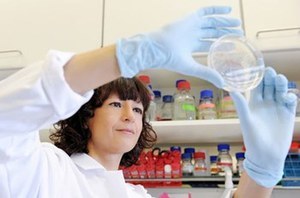The ceremony during which Emmanuelle Charpentier – French biochemist, geneticist and microbiologist, and Nobel Prize winner in Chemistry in 2020 – will be awarded the honorary degree, will take place on Friday 27 September at 16.30, in the Aula Absidale di Santa Lucia (Via de’ Chiari, 25a – Bologna). The ceremony will also be streamed live on YouTube. This recognition from the University celebrates Charpentier’s revolutionary contribution to science, especially in molecular biology and genetics.
The Rector Giovanni Molari will open the ceremony with institutional greetings. These will be followed by two speeches, one given by Prof. Silvio Salvi, professor of Agricultural Genetics, and the other by Rosalba Lanciotti, Director of the Department of Agricultural and Food Sciences.
After receiving the honorary degree, Emmanuelle Charpentier will deliver a keynote lecture.
Awarding an honorary degree to Emmanuelle Charpentier not only acknowledges her extraordinary scientific career, but also honours a vision of science that transforms humanity. Her research on genome editing has revolutionised life sciences, contributing to the development of innovative therapies against cancer and hereditary diseases. Moreover, in the agricultural sector, it has provided new opportunities to grow new crop varieties that are better suited for sustainable production systems and more resilient to climate change.
Emmanuelle Charpentier is currently the Director of the Max Planck Unit for the Science of Pathogens in Berlin. Together with Professor Jennifer Doudna (University of California - Berkeley), she was awarded the 2020 Nobel Prize in Chemistry for developing one of the most advanced tools in genetic technology – the genome editing system based on the CRISPR/Cas9 technique.
This method allows for precise modification of DNA in living organisms, opening unprecedented possibilities for medicine, agriculture and many other fields. This work represents one of the most important scientific advancements of the 21st Century.
CRISPR/Cas9 systems are already widely used in the teaching laboratories of degree courses in biology, biotechnology, medicine, and agriculture, as well as by PhD students and researchers in the University of Bologna's research labs.
In just a few years, this technology has already begun revolutionising life sciences, with applications ranging from pharmaceuticals to new crop varieties, which are now reaching society.
The adoption of CRISPR/Cas9 techniques is also being promoted by professional organisations in agriculture and industrial biotechnology. Additionally, the European Commission is preparing a revision of the regulations governing the introduction of these techniques in agricultural crop improvement.
In addition to the Nobel Prize, Emmanuelle Charpentier has received numerous awards from leading universities worldwide and holds more than seven honorary degrees from prestigious international institutions.
Since 2015, she leads the Max Planck Institute for Infection Biology in Berlin. Since 2016, she is Honorary Professor at the Humboldt University in Berlin. In 2018 she established an independent research institute, the Max Planck Unit for the Science of Pathogens.
In addition to co-holding several patents based on the CRISPR-Cas9 technique, Charpentier is co-founder – with Rodger Novak and Shaun Foy – of two biotechnological societies, ‘CRISPR Therapeutics’ ed ‘ERS Genomics’, which have the aim of applying this technique in the biomedical and biotechnological sectors.
§Since 2013, she has been teaching and conducting research in Germany, at the Medizinische Hochschule in Hannover (MHH) and the HelmholtzZentrum für Infektionsforschung in Braunschweig (HZI). In January 2014, she was the second woman to have been nominated Alexander von Humboldt Professor, adividing her time between the three research institutions of Umeå, Hannover e Brunswick.

